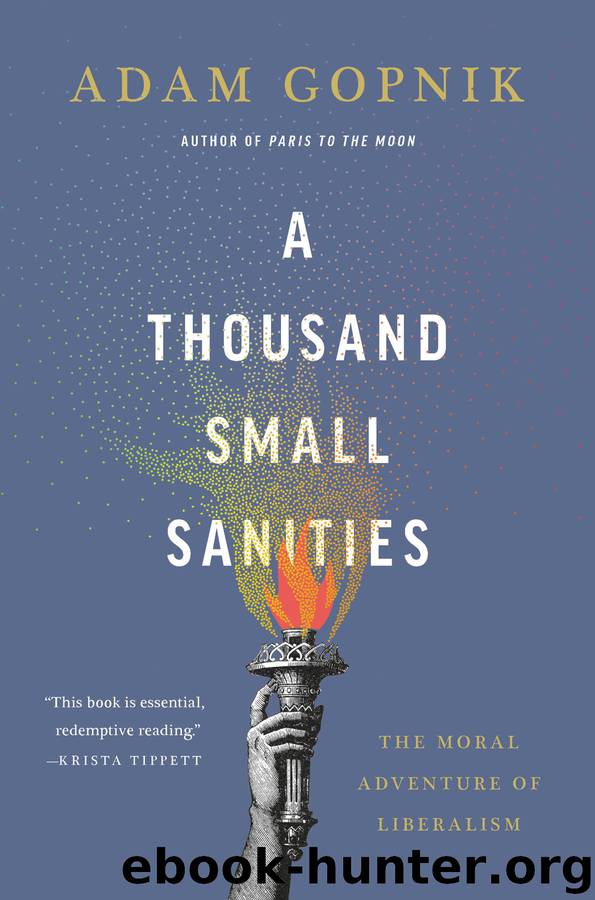A Thousand Small Sanities: The Moral Adventure of Liberalism by Adam Gopnik

Author:Adam Gopnik
Language: eng
Format: epub
Publisher: Basic Books
Published: 2019-05-13T23:00:00+00:00
What can the liberal say in response to all of these assaults?
First, that the broader communitarian assault on liberalism depends on a very false picture of what liberals have ever believed, or what liberals in power have, for good or ill, actually done. The idea that liberalism is narrowly devoted only to individual rights and the pursuit of selfish material well-being is a cartoon with little connection to liberal ideas or practices.
If we look at all the classic liberal texts and, more important, the actual historical political practices of liberalism, we see immediately that all have a powerful idea of collectivity and community at their heart. Adam Smith is not Ayn Rand. Smith believes that the sympathy of a community, escaping from fearful clan feuds, is the necessary prelude to free-market exchanges. As Habermas and Putnam have each in their different ways shown us, liberal political practices rest on liberal social practices—the Declaration of the Rights of Man begins with a conversation in a café, and local democracy has a better chance of triumphing in Italy when amateur opera groups sing out first.
The great liberal thinkers whose shared arc I’ve been trying to describe all began by reflecting on relationships, on what happens when people meet people and what obligations they have to each other. Montaigne brooding on compassion was not brooding on the inner life alone; he was thinking about what happened to animals when men went in groups to hunt them and what happened to the men’s minds after they killed the animals. John Stuart Mill and Harriet Taylor were not opposed to the duties of family life. Just the opposite: they paused from starting one of their own because they wanted to show respect for the family life Taylor already had. They just thought that family life ought to be fairer to everyone in the family. What’s called liberal individualism always emerges from an assumed background of connectedness.
More concretely, the great liberal politicians of the mid-nineteenth century who helped turn liberalism from an ancient idea of generosity and cultivation into an effective political practice were all rooted in the project of reinforcing common bonds. The liberal revolutions of that era were unifying revolutions, bringing together different ethnic groups under the common umbrella of one nation. We think of modern nationalism as a divisive poison, but in the nineteenth century, liberal nationalism was inherently patriotic in the modern sense, a way of reaching past divides among people to create nations—out of many, one.
That kind of liberalism was supremely preoccupied with building coherent communities across ethnic lines. A moving, though in America, little-known example occurred in 1849 when Robert Baldwin, the Protestant leader of Upper Canada, today’s Ontario, and Louis-Hippolyte LaFontaine, the leader of the almost exclusively Catholic Quebec, then called Lower Canada, joined together against an anti-Catholic mob in Montreal, for both national unity and liberal rights. They had every reason to break apart into two warring tribes, but Lafontaine and Baldwin defied the rioting English-speaking crowd, standing
Download
This site does not store any files on its server. We only index and link to content provided by other sites. Please contact the content providers to delete copyright contents if any and email us, we'll remove relevant links or contents immediately.
| Anarchism | Communism & Socialism |
| Conservatism & Liberalism | Democracy |
| Fascism | Libertarianism |
| Nationalism | Radicalism |
| Utopian |
The Secret History by Donna Tartt(16608)
The Social Justice Warrior Handbook by Lisa De Pasquale(11485)
Thirteen Reasons Why by Jay Asher(7782)
This Is How You Lose Her by Junot Diaz(5753)
Weapons of Math Destruction by Cathy O'Neil(5029)
Zero to One by Peter Thiel(4816)
The Myth of the Strong Leader by Archie Brown(4785)
Promise Me, Dad by Joe Biden(4440)
Stone's Rules by Roger Stone(4412)
Beartown by Fredrik Backman(4403)
How Democracies Die by Steven Levitsky & Daniel Ziblatt(4392)
The Fire Next Time by James Baldwin(4336)
100 Deadly Skills by Clint Emerson(4070)
A Higher Loyalty: Truth, Lies, and Leadership by James Comey(4024)
Rise and Kill First by Ronen Bergman(4008)
The David Icke Guide to the Global Conspiracy (and how to end it) by David Icke(3875)
The Farm by Tom Rob Smith(3869)
Secrecy World by Jake Bernstein(3773)
The Doomsday Machine by Daniel Ellsberg(3725)
